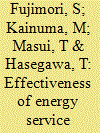|
|
|
Sort Order |
|
|
|
Items / Page
|
|
|
|
|
|
|
| Srl | Item |
| 1 |
ID:
150892


|
|
|
|
|
| Summary/Abstract |
The traditional energy utility business model is under pressure, and energy services are expected to play an important role for the energy transition. Experts and scholars argue that utilities need to innovate their business models, and transform from commodity suppliers to service providers. The transition from a product-oriented, capital-intensive business model based on tangible assets, towards a service-oriented, expense-intensive business model based on intangible assets may present great managerial and organizational challenges. Little research exists about such transitions for capital-intensive commodity providers, and particularly energy utilities, where the challenges to servitize are expected to be greatest. This qualitative paper explores the barriers to servitization within selected Swiss and German utility companies through a series of interviews with utility managers. One of them is ‘asset transformation’, the shift from tangible to intangible assets as major input factor for the value proposition, which is proposed as a driver for the complexity of business model transitions. Managers need to carefully manage those challenges, and find ways to operate both new service and established utility business models aside. Policy makers can support the transition of utilities through more favorable regulatory frameworks for energy services, and by supporting the exchange of knowledge in the industry.
|
|
|
|
|
|
|
|
|
|
|
|
|
|
|
|
| 2 |
ID:
136247


|
|
|
|
|
| Summary/Abstract |
A reduction of energy service demand is a climate mitigation option, but its effectiveness has never been quantified. We quantify the effectiveness of energy service demand reduction in the building, transport, and industry sectors using the Asia-Pacific Integrated Assessment/Computable General Equilibrium (AIM/CGE) model for the period 2015–2050 under various scenarios. There were two major findings. First, a 25% energy service demand reduction in the building, transport, and basic material industry sectors would reduce the GDP loss induced by climate mitigation from 4.0% to 3.0% and from 1.2% to 0.7% in 2050 under the 450 ppm and 550 ppm CO2 equivalent concentration stabilization scenarios, respectively. Second, the effectiveness of a reduction in the building sector׳s energy service demand would be higher than those of the other sectors at the same rate of the energy service demand reduction. Furthermore, we also conducted a sensitivity analysis of different socioeconomic conditions, and the climate mitigation target was found to be a key determinant of the effectiveness of energy service demand reduction measures. Therefore, more certain climate mitigation targets would be useful for the decision makers who design energy service demand reduction measures.
|
|
|
|
|
|
|
|
|
|
|
|
|
|
|
|
|
|
|
|
|